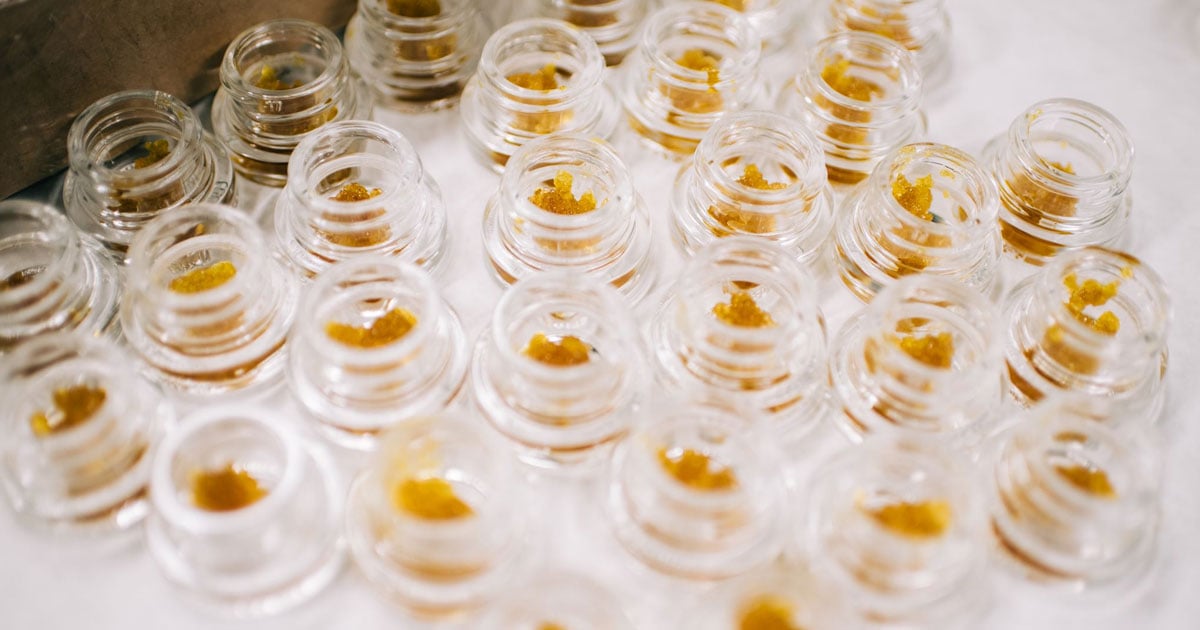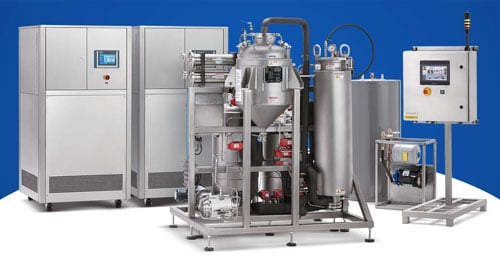The extracts and concentrates industry is constantly evolving and developing new processes and products to satisfy every type of cannabis and hemp consumer. Along with it, new terminology has emerged to capture the differences in the various complex extraction processes. Terms such as CBD isolate, broad spectrum, and full spectrum have all made their way into the vernacular of the extraction industry, and are often times used incorrectly or interchangeably.
Understanding the foundations of these terms is important for differentiating the advantages and disadvantages of the various extraction methods and product types. There are important differences between the vast array of extracts: CBD isolate, broad spectrum, and full-spectrum product formulations, and using the correct verbiage is vital for producers and consumers alike.

Hemp Oil vs. Hemp Seed Oil vs. CBD Oil: The Where and How of Hemp Extraction
Hemp extraction is the most popular form of CBD extraction for a variety of reasons; it has rich CBD content, low THC levels, and the added benefit of coming from a less-aggressively regulated source. Every strain of cannabis and hemp has its own unique chemical profile, meaning that each product will contain different amounts of cannabinoids and terpenes that were purposely bred by cannabis farmers.
Three of the more commonly confused and conflated terms in hemp extraction are hemp seed oil, hemp oil, and CBD oil. Let's explore the key differences:
Where Does Hemp Seed Oil Come From?
Hemp seed oil is oil extracted from the hemp seed specifically, which contains no CBD. While it may have some health benefits, including diet and skin care, any benefit derived from CBD will not be present in hemp seed oil. You may find that extractors cut their extract with this oil to help dilute the extract, it will give the tincture a more earthy flavor but as stated does not add any additional CBD to the mixture.
Where Does Hemp Oil Come From?
Hemp oil is extracted from almost every part of the hemp plant other than the seed, including the flowers, stems, and leaves. All of these parts of the plant contain CBD, so any hemp oil containing CBD can also be called CBD oil. Hemp oil extracted from hemp flowers contain the highest level of cannabinoids and terpenes, which are concentrated on resinous trichome glands on hemp flowers.
Where Does CBD Oil Come From?
Hemp oil, or CBD oil extracted from hemp plants, is different than cannabis extract, but both can be called CBD oil. The main difference is that while CBD can be extracted from cannabis plants, it can also extract trace THC along with it. Typically, any residual THC in CBD oil is intentional, as cannabis consumers demand more CBD presence in their extracts.
How Are Hemp Oil and CBD Oil Extracted?
Just as important as where the oil is extracted is how it is extracted, and there are multiple ways to target chemical compounds found in cannabis. Hemp producers employ a variety of extraction methods, including alcohol, supercritical CO2, and butane extraction to remove the therapeutic compounds found in hemp plants. Each method caters to a varying yield, quality, and purity of hemp-derived CBD.
While each of these extraction methods have their place, BHO extraction is one of the most widely used methods with cannabis and is now moving to dominate the hemp market with ts ability to extract the full representation of the plant in concentrated form. This is called full-spectrum extraction.
To learn more about BHO extraction methods, check out our post on BHO extraction here.
Extraction Outcomes: CBD Isolate, Broad Spectrum, and Full Spectrum
Extraction methods matter because different extraction methods will reap different outcomes in terms of retaining the hemp plant’s original compounds. For example, if the goal is to retain valuable terpenes and a full complement of cannabinoids through the extraction process, butane extraction is the best option because CO2 can lose terpenes and cannabinoids at the beginning of the extraction process, while ethanol can lose terpenes at the end. Super chilled Butane or Propane extraction won’t lose those valuable and pertinent hemp compounds.
These extraction outcomes also come with their own set of terminology: isolate, broad-spectrum, and full-spectrum extracts.
What Is CBD Isolate?
One extraction method is to remove every compound except for CBD, thereby producing an isolate product that often resembles a white powdery substance. CBD isolate, also known as pure CBD, is an odorless and tasteless crystal or powder that contains 99+ percent CBD.
How Is CBD Isolate Made?
CBD isolate is accomplished using chromatography. This process takes out all of the terpenes, which are responsible for scent, flavor, and other differentiators. Additionally, chromatography separates out the unwanted cannabinoids, such as the most commonly known psychoactive one — THC. Last, but not least, this process removes all plant matter.
Why CBD Isolate?
Many people prefer CBD isolate due to its neutral flavor and taste, which makes it easy to add to food, drinks, and topicals. Extraction methods remove every other compound including THC. Individuals who don’t want to risk consuming THC or failing a drug test will often look for CBD isolates.
Can CBD Isolate Be Full Spectrum?
Even if terpenes are re-introduced into a CBD isolate, that doesn’t make it a full- or broad-spectrum product. Some studies have shown that CBD isolates aren’t as effective in higher doses as full-spectrum products that contain the original array of compounds. Researchers believe the additional terpenes, cannabinoids, and flavonoids amplify the positive effects of CBD and mitigate any side effects. This is what is referred to as the entourage effect.
What Is Broad Spectrum?
Broad-spectrum CBD products fall somewhere between CBD isolates and full-spectrum extracts. Essentially, broad-spectrum contains much of the hemp’s cannabinoids and terpenes, minus the THC.
State-of-the-art chromatography processes remove all of the THC from a full-spectrum extract. This method of extraction keeps the hemp strain’s intended compounds. Adding cannabinoids and terpenes back into a CBD isolate would not be considered broad or full-spectrum.
What Is Full Spectrum?
Full-spectrum extraction preserves CBD from hemp, along with other common cannabinoids, terpenes, flavonoids, and fatty acids. Full-spectrum products contain almost all of the naturally occurring compounds found in hemp. Full-spectrum CBD features all of the hemp’s chemical compounds, including other cannabinoids such as cannabinol (CBN), cannabichromevarinic acid (CBVA), cannabicyclol (CBL), and THC (among others). Full-spectrum products contain only a trace amount of THC — typically less than 3 percent concentration.
Full-spectrum oil retains its complementary and medically applicable compounds. Researchers have found that the cannabis plant’s minor cannabinoids have therapeutic value, and that terpenes, flavonoids, and fatty acids support the entire endocannabinoid system.
One study published by the Lautenberg Center for Immunology and Cancer Research compared the effects of a CBD isolate and full-spectrum extract. It found that CBD isolate had a bell-shaped response curve where it peaked at a medium dose and tapered off at higher and lower doses. Responsiveness to the full-spectrum solution, however, “continued to increase as higher doses were administered.” While CBD was effective at reducing inflammation and pain at a certain dose, the entire palette of cannabinoids is needed to provide increasingly higher dosages. This is a great explanation of the “entourage effect.”
False Claims
The synergistic, entourage effect of full-spectrum extracts is what makes it the most popular type in the cannabis and hemp field. Unfortunately, this can also lead to false claims made by producers that their product is “full spectrum” when, in fact, it is not. This is particularly prevalent in the CBD hemp oil industry, where various methods are used which do not in reality yield the full-spectrum results they claim.
Despite the ongoing claims made by CO2 and other extract processors, BHO and light hydrocarbon extraction is the only method for obtaining true full-spectrum outcomes.
Conclusion
There is a lack of clarity surrounding the most prevalent terminology in cannabis extraction. As light hydrocarbon (BHO) extractors, we believe in the importance of understanding what types of extracts are best for a given purpose, and hope this article has served as a helpful guide in building that understanding.


